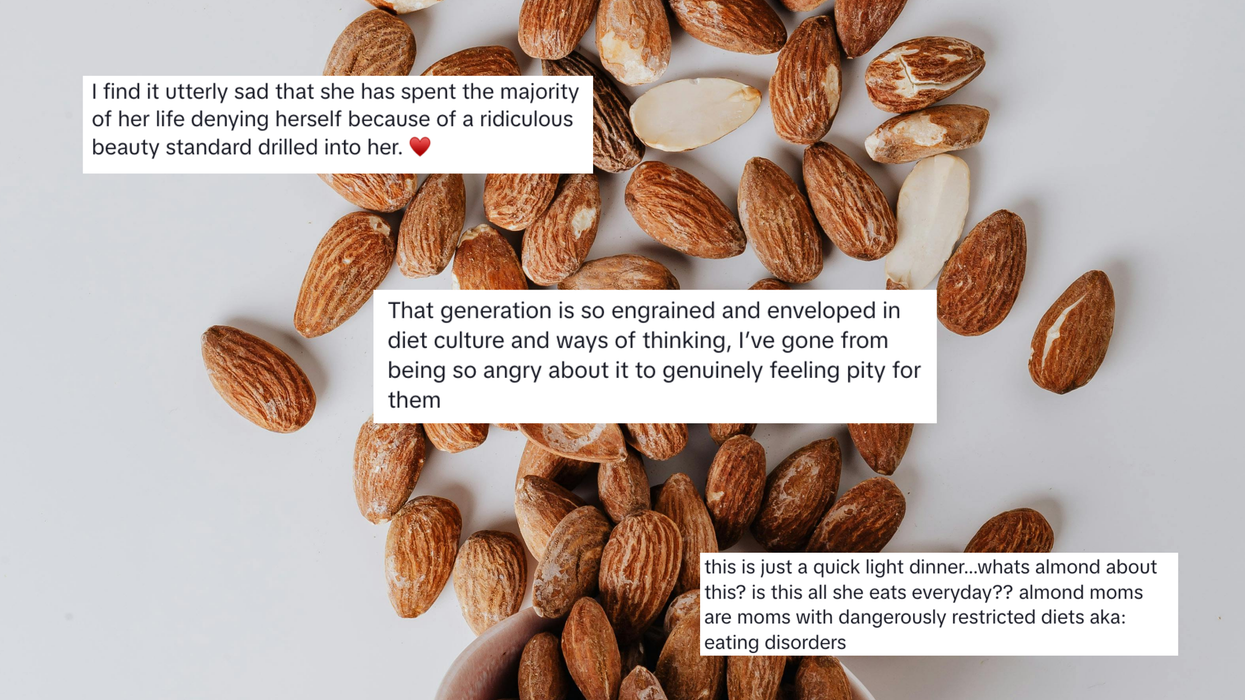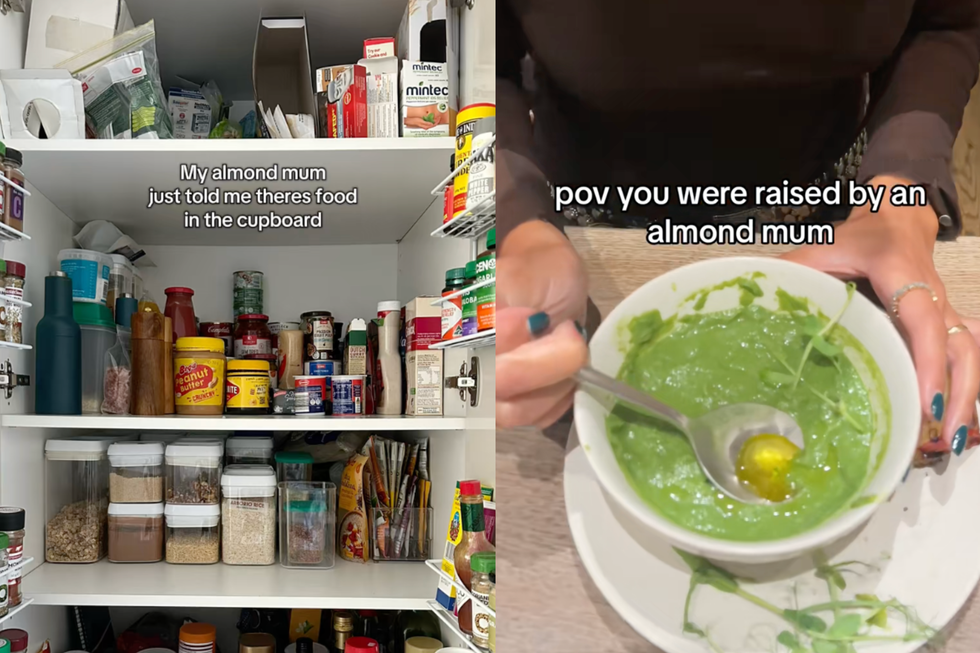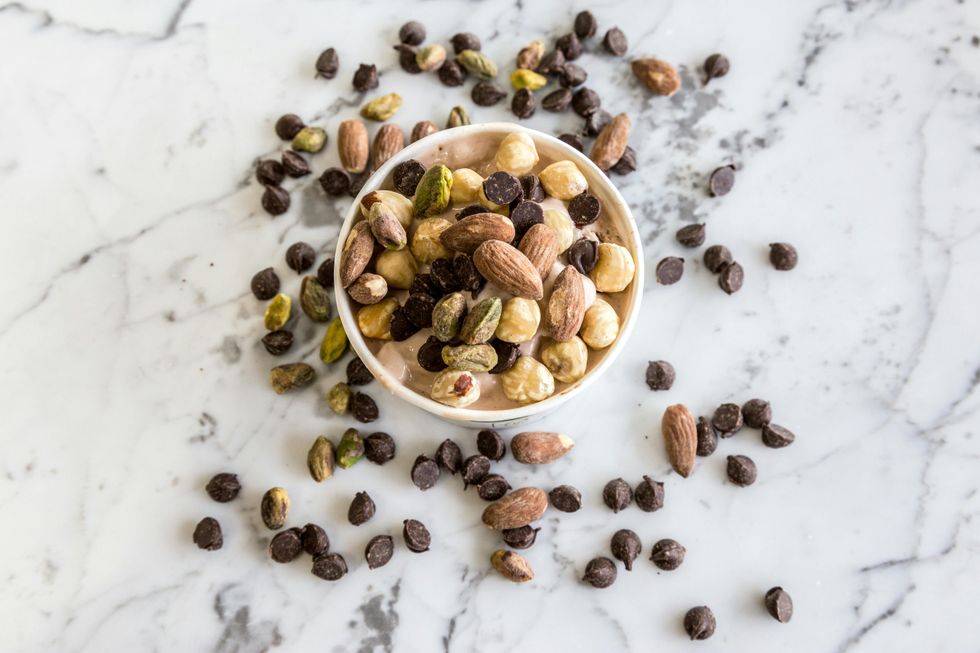
Meet the almond mum. She might be living under your own roof, or even in the home of one of your friends, but now, she's all over your FYP too.
"I ate a salad for lunch so I'll skip dinner", she can often be heard saying. "You're really eating takeout? I haven't touched one of those in 25 years", she might snigger.
Her cupboards are full of ingredients - but not snacks - each one free from refined sugars, seed oils, or whatever the latest buzzword of the moment might be.
She's a byproduct of the diet culture generation, so obsessed with thinness wrapped in the guise of being the "perfect healthy example"; and somehow, she's become the centre of viral TikTok trends, where 'almond moms' across the globe are pitted against each other, while the internet laughs at just how extreme they can go. Quite frankly, it feels dystopian.
"POV your friends are being starved to death at the almond mum household", the caption of one recent, viral TikTok read, as one self-proclaimed almond mom turned her nose up at her daughter and friends enjoying fish and chips.
"When someone tells me to go to hell but this is what my almond mum thinks a dinner is", another video stated, alongside a clip of a basic salad being emptied out into a bowl.

In the comments, a similar story is told by the children of 'almond' parents, who have felt the pressure passed down.
"I received chocolate covered fruits for my bday and my mum kept following me the whole night making sure I wasn’t eating them", one person wrote.
"Offered a girl a free croissant at work yesterday and her mum swooped in saying it was full of calories", another added.
"That generation is so engrained and enveloped in diet culture and ways of thinking, I’ve gone from being so angry about it to genuinely feeling pity for them", a third expressed, sharing their concern.
It's about time we called this 'almond mom' fantasy what it really is: A catalyst for eating disorder culture, more specifically orthorexia, and by taking the seriousness out of it, we're only opening the door to a noughties body image crisis revival.
Orthorexia, by definition, is linked to being overly-obsessed with 'pure' and 'healthy' eating - and can exhibit similar behaviours to anorexia, something which can often coincide with it.
The term 'almond mum' originated from Bravo'sThe Real Housewives of Beverly Hills, more specifically, from Yolanda Hadid (the mother of now-supermodels, Gigi and Bella), who would openly enforce strict rules around eating onto her daughters on screen, which included restriction around birthday cakes, and taking part in her own 'Master Cleanse'; a liquid fasting plan from the 1940s in which you only consume a homemade lemonade concoction for up to 14 days.
One of her most notable moments, the birthplace of the 'almond mum' accolade, was a scene in which a then-18-year-old Gigi is on a modelling shoot, and calls Yolanda to complain about how bad her hunger is making her feel.
"I'm feeling really weak. I had, like, half an almond," the then-teenage model tells her, to which she simply responds: "Have a couple of almonds, and chew them really well."
In an interview with People, Yolanda explained she had just come out of surgery when that clip was filmed and her comment was taken out of context - but the sentiment very much remains the same.
- YouTube www.youtube.com
The moment, filmed all the way back in 2013, has since become enveloped in a sweeping generalisation to describe people who possess similar restrictive behaviours around diet.
A survey from the Mental Health Foundation showed that upon quizzing 13–19-year-olds, they found that 35 per cent said their body image causes them to 'often' or 'always' worry - the same age group that are more active on social media than ever before.
Similarly, a 2015 study from Common Sense Media reported that children 5 to 8 years old “who think their moms are dissatisfied with their body are more likely to feel dissatisfied with their own bodies.”
"As a dietitian and nutritionist, I’m increasingly concerned by the rise of so-called 'almond mum' culture on social media. While often presented as humorous or satirical, this trend trivialises deeply rooted issues around disordered eating and diet culture", says dietitian and nutritionist, Karine Patel.
"Disordered eating is a serious mental health issue, and reducing it to internet humour risks desensitising people to its impact. It also perpetuates the cycle of generational diet culture, where problematic relationships with food are normalised rather than challenged. In my practice, I often see clients, particularly adolescents and young adults, who are struggling to unpick years of restrictive messaging that began in the home."
So just how did we get to this point? Gen Z are openly more critical of diet culture; and inherited trauma, along with extreme or outdated values, create the perfect trifecta for viral content. It's a practice that helps others feel validated - or that issues that have plagued their own lives and remained taboo, may just be skeletons in the closets of others' too.
However, in the case of the 'almond mum', it's about time we recognised it's only perpetuating the harmful stereotypes of diet culture that we've tried so hard to veer away from in recent years.

Patel adds: "We must be cautious not to dismiss the 'almond mum' phenomenon as harmless. Instead, we should use the spotlight it's gained to open up more nuanced conversations about the importance of balanced, non-restrictive eating, and the value of modelling healthy, inclusive attitudes toward food in family settings."
The almond mum is no longer someone we're concerned for, but a caricature of someone we all know, and someone who at the heart of it, probably needs our empathy.
"Someone showing signs of an eating disorder, such as excessively restricting food or becoming very concerned about what they're eating, should always be taken seriously. There's an unhelpful stereotype that eating disorders only affect young people, but we know that some people will develop eating disorders in mid or later life", Umairah Malik, clinical manager at Beat told Indy100.
"We still don't fully understand the causes of eating disorders but it's thought to be a combination of genetic, neurobiological and sociocultural factors. However, we do know that shaming or making jokes about someone's behaviour won't help in the slightest.
"Instead, we'd encourage anyone worried about a loved one to have a calm, non-judgemental conversation about their concerns, and not while they're already stressed, for example just before or after meals.
"Being diagnosed with an eating disorder, particularly if it's later on in life, can feel very overwhelming, but with the right support making a full recovery is possible at any age."
For anyone struggling with the issues raised in this article, eating disorder charity Beat’s helpline is available 365 days a year on 0808 801 0677.
NCFED offers information, resources and counselling for those suffering from eating disorders, as well as their support networks. Visit eating-disorders.org.uk or call 0845 838 2040
Why not read...
Surrogate shares why you shouldn't be angry at celebrities for choosing to have a baby through one
Sign up for our free Indy100 weekly newsletter
Have your say in our news democracy. Click the upvote icon at the top of the page to help raise this article through the indy100 rankings.













Donald Trump called a ‘child’ after latest Nobel Peace Prize comments